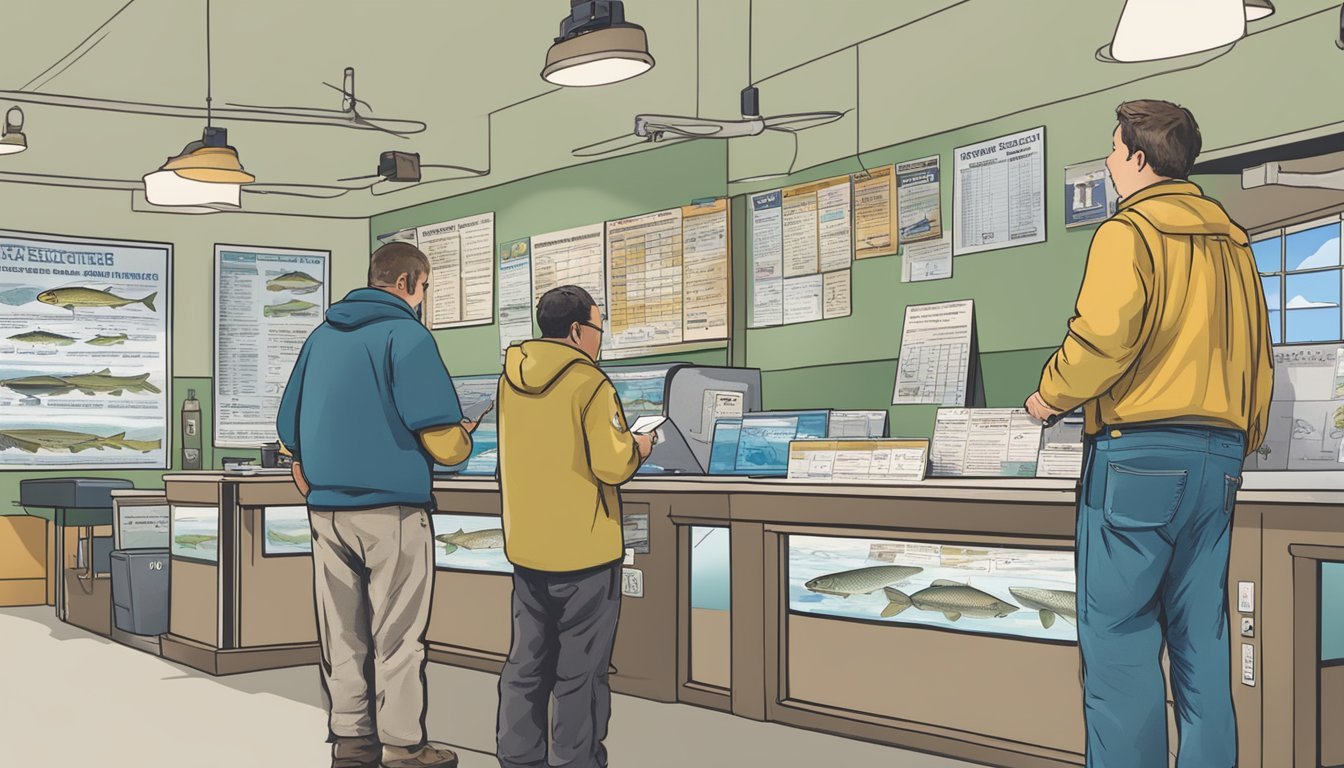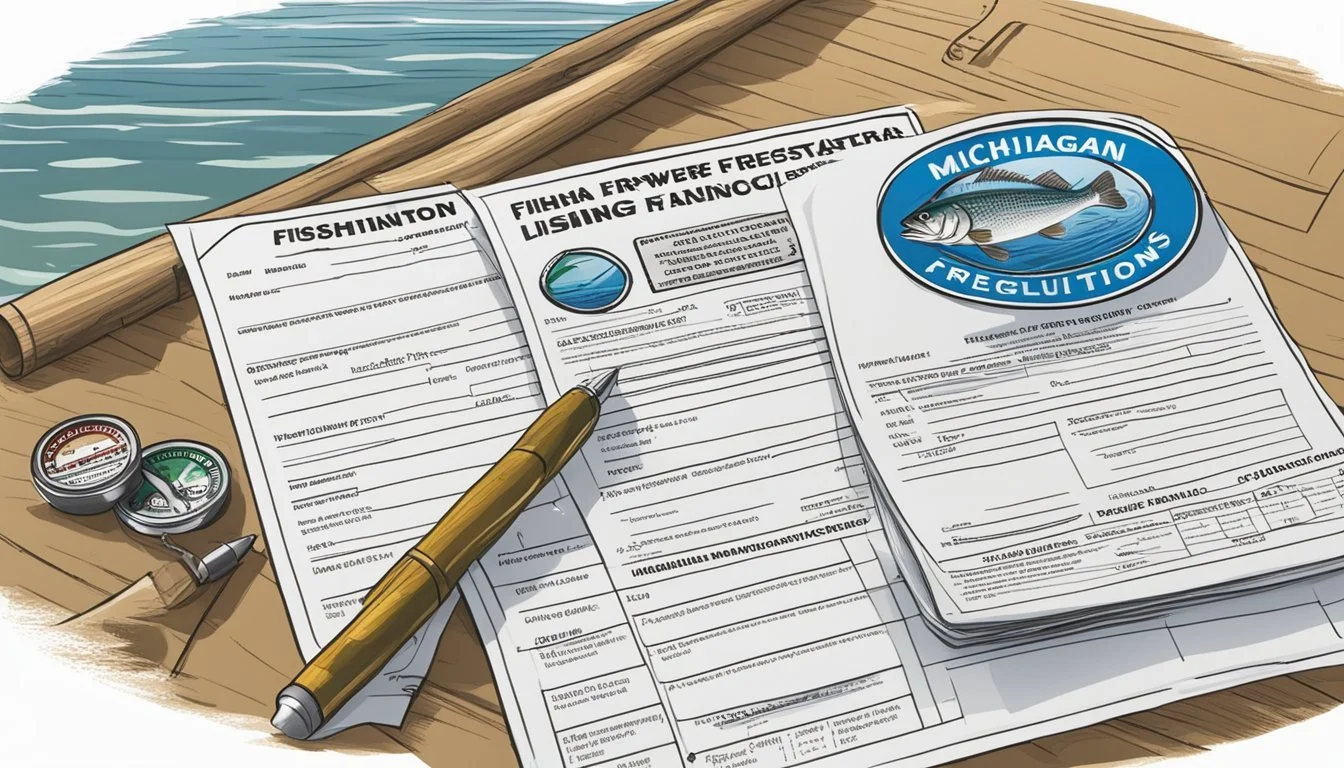How to Get a Michigan Freshwater Fishing License
A Step-by-Step Guide
Anglers looking to fish (What wine goes well with fish?) in the abundant freshwater bodies of Michigan are required to obtain a fishing license. This state, boasting the longest freshwater coastline in the United States, offers plentiful fishing opportunities in its lakes and rivers, including access to four of the Great Lakes. With such rich natural resources, the Michigan Department of Natural Resources (MDNR) regulates fishing activity to ensure sustainable practices and the conservation of aquatic wildlife.
Obtaining a Michigan fishing license is a simple and essential process for any resident or visitor wishing to fish in the state's waters. License options vary, catering to different needs, and are available for residents, non-residents, seniors, and youth. The MDNR provides a convenient system that allows for quick and easy purchase of fishing licenses online, but they can also be obtained in person at authorized retail outlets.
The array of licenses includes annual all-species licenses, which are valid from March 1 through March 31 of the following year, as well as short-term or daily options for those looking to fish on a more casual basis. To further streamline the process, Michigan has removed the requirement for a sturgeon permit and harvest tag, though anglers must still register their sturgeon harvest within 24 hours. These regulations and services demonstrate Michigan's commitment to maintaining its waters for both today's anglers and future generations.
Eligibility and Requirements
To fish in Michigan's freshwater bodies, individuals must meet specific residency and age criteria. Special privileges are afforded to seniors and veterans regarding licensing requirements and fees.
Residency Criteria
Residents: Individuals are considered residents of Michigan if they have lived in the state for at least six consecutive months prior to the license application. Non-Residents: Those who have not met this criterion are considered non-residents and must apply for a non-resident license.
Age-Based Considerations
Youth: Those under the age of 17 are not required to obtain a fishing license; however, they must comply
How to Purchase a Michigan Fishing License
Purchasing a Michigan fishing license is straightforward. An individual can either buy it online for immediate use or visit designated vendors, such as DNR offices or Walmart, for in-person purchases.
Online Purchasing Process
To purchase a license online, individuals should navigate to the Michigan Department of Natural Resources (DNR) eLicense website. The steps are:
Select the desired license type.
Fill in the necessary personal details.
Provide proof of residency if required for resident rates.
Complete the payment using a credit card.
Upon successful purchase, the license can be printed out for immediate use.
In-Person Purchase Locations
Licenses can also be purchased in-person at various locations including:
DNR Customer Service Centers
Authorized license vendors such as Walmart
Participating sporting goods stores
Customers should look for signs indicating the availability of Michigan DNR licenses at these locations.
Required Identification and Documents
When purchasing a Michigan fishing license, the individual must present:
A valid identification card, such as a driver’s license.
Proof of residency, which can be a state-issued ID for residents to qualify for resident rates.
Non-residents will need to provide identification that verifies their state of permanent residence.
Different Types of Fishing Licenses
Michigan offers an array of fishing licenses to cater to the diverse needs of anglers. Depending on the duration of fishing activity and the status of the angler, one can select the appropriate license.
Annual Licenses
Residents and non-residents can obtain Annual All Species Licenses. These licenses allow anglers to target all species of fish throughout the fishing season. For residents, the cost is $26, while non-residents are charged $76. Additionally, Annual All Species Senior Licenses are available for Michigan residents who are 65 years of age or older at a reduced fee of $11. These licenses offer the same benefits to seniors at a discounted rate.
Daily and Short-Term Licenses
For those looking for shorter commitments or who fish on a less frequent basis, Michigan provides the option of Daily All Species Licenses. These licenses are valid for 24 hours from the time of purchase. Costs for these short-term licenses may vary, but typically residents and non-residents can expect to pay a fee for each day of fishing. A 72-Hour All Species License is also available for both residents and non-residents.
Special License Types
Beyond standard licenses, there are special types of licenses designed for specific groups. These include voluntary youth licenses for those under the age of 17. At $2, these Annual All Species Youth Licenses encourage the younger generation to participate in fishing. Though not typically required, they help to support fishery management in Michigan. Currently, Michigan does not offer a lifetime fishing license option, however, many find the annual and short-term options ample for their needs.
Understanding Fishing Regulations
Before heading out with a rod and reel, it's crucial for anglers to familiarize themselves with Michigan’s fishing regulations to ensure the conservation and sustainability of fish populations. These rules are designed to manage different species and methods of fishing effectively.
Fishing Seasons and Species
Michigan designates specific fishing seasons for various species to preserve fish populations and their habitats. For instance, sturgeon has a very limited season and strict regulations due to its status as a threatened species. Salmon, trout, walleye, pike, bass, and muskie are some of the popular species, each with their own set season. Anglers must adhere to these timelines:
Sturgeon: Catch-and-release only during open seasons, which vary by body of water.
Salmon and Trout: Seasons generally open in April, with some exceptions for particular bodies of water and species.
Walleye, Pike, and Muskie: Open seasons usually start in late April to early May.
Bass: Catch-and-immediate-release is often permitted before the traditional opening of the bass season in late May.
Size and Harvest Limits
To ensure healthy population levels, Michigan enforces size and harvest limits on different species. These restrictions often include a minimum size limit and a daily catch limit per angler. Here are some standard limits:
Salmon and Trout: Different size limits based on species and location.
Walleye: Minimum size of 15 inches with a daily limit of 5 in most waters.
Pike: Minimum size of 24 inches with a daily limit of 2 in most waters.
Bass: Minimum size of 14 inches with a daily limit varying from 1 to 5.
Muskie: A minimum size that often exceeds 40 inches with a special harvest tag required.
Specific Rules for Various Fishing Methods
Anglers must also comply with rules for the method of fishing they choose. These regulations are aimed at protecting fish during critical times of the year and ensuring fair chase:
Ice fishing: There may be restrictions on the number of lines used and types of bait.
Fly fishing: Often requires barbless hooks to minimize harm to the fish.
Spearfishing: Allowed for certain species like pike during specific seasons under strict regulations.
Each angler is responsible for knowing these regulations, which are available on the Michigan Department of Natural Resources website or at the point of purchase for a fishing license. Compliance is important not only for the sustainability of fish populations but also to avoid potential fines and penalties.
Fishing Contributions to Conservation
Michigan's fishing license system serves as the backbone of its conservation funding, ensuring the longevity of fish populations and habitats. License sales generate revenue earmarked specifically for preservation and enhancement of the state's aquatic ecosystems.
License Fees and Allocation
Michigan offers various types of fishing licenses, such as the Hunt/Fish Combo which includes a base license, two deer tags, and an annual all-species fishing license. Resident fees for this package are $76, while nonresidents pay $266. Seniors, who are Michigan residents aged 65 and over, enjoy a reduced rate of $43. These fees include a base license that is a prerequisite for any type of hunting or fishing activity in the state.
Revenue from these sales is not arbitrary; the allocation is governed by strict regulations to ensure funds are directed appropriately. A portion of the revenue is often designated for conservation and preservation efforts, making each license purchase a direct contribution to the sustainability of Michigan's natural aquatic environment.
Conservation and Preservation Efforts
The revenue from fishing license sales is pivotal in driving conservation efforts within the state. A statutory surcharge is applied to equipment and motorboat fuel, and these monies serve to further support fishery management, habitat restoration, and educational programs. For example:
A tax of 10% on the sale price of sport fishing equipment
A tax of 3% on the sale price of electric outboard boat motors
These funds are essential for reporting on the state of the fisheries, conducting research, and implementing projects that aim to enhance fish populations and water quality. The Michigan Department of Natural Resources ensures that those who utilize the state’s aquatic resources also participate in their stewardship, making conservation and preservation a shared responsibility.
Additional Information for Anglers
When securing a Michigan freshwater fishing license, anglers should be aware of additional regulatory details that could affect their fishing experience. This includes understanding supplementary permits, fishing in bordering regions, and the legalities that guide fishing activities.
Supplementary Permits and Endorsements
In Michigan, anglers may need supplementary permits or endorsements in addition to their basic fishing license, depending on their specific fishing activities. For instance:
All Species Permit: Required for those aiming to catch species like trout or salmon.
Two-Line Permit: Allows the use of two rods and lines simultaneously.
It is critical to check for any additional gear-specific endorsements, such as those for a net or spear, as they govern the method of take and are often species-specific.
Fishing in Bordering States and Great Lakes
Michigan anglers who fish in the Great Lakes or on bordering state waters should be aware of reciprocal agreements and the need for additional licenses. For example:
Fishing on Lake Michigan might require an Illinois or Wisconsin license, depending on the location.
Anglers casting lines in Lake Erie could need an Ohio license if they cross state boundaries.
Always confirm the applicable license requirements for public waters shared with Indiana, Ohio, and Wisconsin to avoid any legal tangles.
Legal Aspects and Statute References
Legal understanding is essential for anyone fishing in Michigan's waters. Here are some points to consider:
Familiarize yourself with the Michigan Compiled Laws (MCL) for complete statute references on fishing.
It's important to know the rules around permissible methods of take, such as by hook and line, hands, and nets, to avoid snags with the law.
The Michigan Department of Natural Resources (DNR) regulates fishing to safeguard fish populations, and compliance helps ensure the sustainability of Michigan’s rich freshwater ecosystems.
Resources and Further Assistance
Obtaining a Michigan freshwater fishing license involves knowing who to contact and where to seek assistance. The Michigan Department of Natural Resources (DNR) is a primary resource, and specialized guide services can enhance the fishing experience for individuals needing assistance.
Michigan DNR Contact Information
For inquiries about fishing licenses, the Michigan DNR is the authoritative body. Individuals can contact the DNR for information on purchasing licenses, including the DNR Sportcard, which is required for certain non-resident anglers.
Phone: 517-284-6057
Online:
License Purchase: Visit the Michigan DNR eLicense website to buy hunting, fishing, and other outdoor licenses and permits.
General Queries: Access the DNR contact page for additional assistance.
Accessible Fishing Guide Services
For anglers who require additional support or specialized services, there are fishing guide services in Michigan that cater to a range of accessibility needs. These guides are knowledgeable about local fishing spots and are equipped to provide a safe and accommodating fishing experience:
Services Offered: Expert guidance, equipment adaptation, accessible fishing locations.
How to Find a Guide:
Contact the local DNR office for a list of licensed, accessible guide services.
Search online for "Michigan accessible fishing guides" to find services with high customer ratings and positive reviews.
Additional Considerations for Anglers
When obtaining a Michigan freshwater fishing license, certain groups such as minors and individuals with military service or disabilities may have special considerations or benefits. This section details the specific advantages and options available to these groups.
Benefits for Minors and Young Anglers
In Michigan, individuals who are 16 years old or younger do not require a fishing license to fish. They must, however, adhere to all state fishing regulations. Adults can assist minors by setting up equipment, baiting hooks, and casting. When actively assisting, if the adult is not fishing themselves, they are not required to have a license.
Options for Active-Duty Military and Disabled Individuals
Michigan offers complimentary or discounted licenses for certain individuals:
Active-Duty Military: Michigan residents who are members of the military and on active-duty status can obtain a fishing license at a reduced rate or sometimes free of charge, depending on the specific circumstances.
Disabled Individuals & Veterans: There are provisions for Michigan residents with disabilities and veterans to receive discounts on their fishing licenses. These discounts aim to make recreational fishing more accessible.
In both cases, proof of status such as military ID or documentation confirming a disability is typically required to take advantage of these benefits. Additionally, seniors in Michigan may be eligible for reduced-cost fishing licenses, helping to support their continued participation in the sport.
Frequently Asked Questions
This section provides clear and concise answers to common inquiries about the acquisition and management of Michigan freshwater fishing licenses.
Combination Hunting and Fishing Licenses
The Hunt/Fish Combo license is an excellent option for individuals who enjoy both hunting and fishing. It includes a base hunting license, 2 deer tags, and an annual all-species fishing license. The fees are structured as follows:
Resident: $76
Nonresident: $266
Senior (65+, Michigan residents only): $43
Hunters and anglers should remember that purchasing the combo license represents a cost-saving compared to acquiring both licenses separately.
Navigating License Applications and Renewals
When it comes to applications and renewals for a Michigan fishing license, one can proceed with confidence through the Michigan Department of Natural Resources website. Seniors and military personnel should look out for the asterisk (*) symbol indicating eligibility for discounted rates. For renewals, ensure that your personal information is up-to-date to avoid any delays.
Species-Specific Fishing Queries
A general fishing license allows anglers to fish for various species including bass, pike, and walleye. However, it's important to be aware of and adhere to the specific regulations that may apply to each species, such as seasons and bag limits. For those targeting salmon, trout, or muskie, understanding and following the regulations is paramount to maintaining the balance and conservation of Michigan's waterways.
Recreational Opportunities Beyond Fishing
Michigan is not only a haven for anglers but also a playground for nature enthusiasts and outdoor adventurers. Its diverse ecosystems offer a wide range of activities beyond fishing, with ample opportunities for wildlife observation, hunting and trapping, and watercraft adventures.
Wildlife Observation
Michigan's abundant forests, wetlands, and waterways are ideal for observing a wide array of wildlife. Enthusiasts can spot everything from common white-tailed deer to elusive moose and black bears. Birdwatchers can revel in the sight of migratory bird species along the Great Lakes.
Hunting and Trapping Opportunities
Aside from its fishing licenses, Michigan provides a variety of hunting licenses and permits. They cover different game species, including deer, turkey, and small game such as rabbits and squirrels. Properly licensed hunters may also trap fur-bearing animals like beavers and mink, adhering to the regulations set forth for seasons and methods.
Hunting Seasons: Varied by species; check the latest regulations.
Fur Harvester License: Required for trapping.
Watercraft Use and Regulations
The state offers extensive opportunities for using watercraft on its numerous lakes and rivers. Operators of various watercraft, including kayaks, canoes, and motorboats, must follow the safety regulations. During the winter, snowmobiles become a popular means of traversing frozen waterways, with specific guidelines to ensure the safety of all involved.
Watercraft Regulations: Life jackets required; adherence to no-wake zones.
Snowmobile Usage: Designated trails; mandatory registration.
By exploring these activities, Michiganders and visitors alike can experience the natural beauty and exciting recreation Michigan has to offer beyond its renowned fishing opportunities.
Conclusion
Acquiring a Michigan freshwater fishing license is a straightforward process essential for legal fishing in the state's abundant lakes and rivers. Individuals should choose the appropriate license type based on their residency status, age, and intended fishing activities.
Residents have the benefit of purchasing an annual all-species license at $26, ensuring a year-round fishing experience. Nonresidents can obtain their annual all-species license for $76, granting them the same extensive fishing rights as residents. Seniors and individuals who are legally blind and Michigan residents find their license fee reduced to $11.
It is imperative to note that children under 17 may fish without a license, promoting youth involvement in the sport. However, any adult assisting them must not engage in fishing themselves unless licensed.
The process can be completed online, which is convenient and efficient, allowing anglers to start fishing relatively quickly after purchase.
For an enjoyable and compliant fishing experience in Michigan, anglers should make sure they are aware of and adhere to all fishing regulations. It stands as a responsibility for each person to contribute to the conservation efforts by maintaining a valid license and respecting the aquatic environment.










